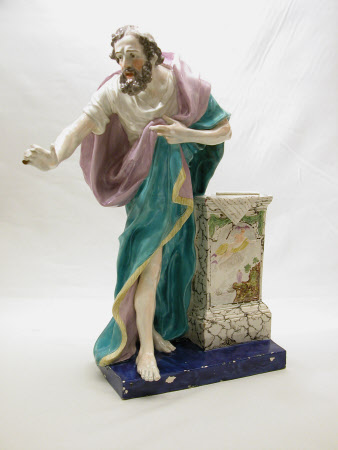Demosthenes
Enoch Wood (Burslem 1759 - Burslem 1840)
Category
Ceramics
Date
1793 - 1818
Materials
Pearlware
Measurements
480 x 388 mm
Place of origin
Staffordshire
Order this imageCollection
Saltram, Devon
NT 870877
Summary
Figure of Demosthenes, pearlware, standing on rectangular base with plinth to his left on top of which is a scroll, the bearded figure stands leaning forward with his right arm raised and hand spread open, his left hand holding his robes, Enoch Wood or Wood & Caldwell, Burslem, Staffordshire, ca 1793-1818; the figure naturalistically decorated in blue, purple, brown and flesh coloured enamels, the plinth to his left painted to resemble veined marble, with a green swag in relief above an arched panel enclosing a scene showing a small figure of Demosthenes standing on a rocky promontory addressing the waves, with two sailing ships in the distance, and overhead, a larger figure of Hermes/Mercury holding a caduceus with a cloud below him.
Full description
The figure represents Demosthenes (384-322 BC), who was a statesman and orator in Athens. Orators were professional public speakers who delivered lectures on political and philosophical subjects. A scene on the plinth to his left shows a small figure of Demosthenes lecturing to the sea – which he was known to do – as Hermes, the messenger of the gods associated with eloquence, hovers above. The figure has also been referred to as Eloquence and in the nineteenth century was thought to depict Saint Paul Preaching at Athens. Although many figures of literary and mythological characters were produced in the Staffordshire Potteries, examples at this scale are rare. It would probably have been intended for display in a library, representing the owner’s knowledge of the Classical world. The figure is marked on the back ‘E WOOD’ for Enoch Wood, who was one of the wealthiest and most successful potters in Burslem. Wood came from a potting family, working first (aged nine) for Josiah Wedgwood and later apprenticed to Humphrey Palmer. By 1784 he was in business with his cousin, Ralph Wood, later going into partnership with James Caldwell. In the latter years of his career, he exported vast quantities of blue and white ceramics to America. Outside of his success in business, Wood was prominent in his community, funding street lighting and paving in Burslem and using his factory’s engines to pump and supply clean water to its residents. The original model for Wood’s figure is probably by the sculptor John Cheere, whose workshop produced a full-size version of Demosthenes in the 1750s. Versions at a reduced size (20 inches, about the size of the Saltram figure) were then sold by Cheere, including to Burton Constable Hall in 1762 (LDS962). Another possibility is Charles Harris, a supplier of plaster casts based on The Strand, London. Harris also made a 20 inch figure of Demosthenes and probably supplied other models to Enoch Wood, though none of the originals survive. Other examples of this figure marked ‘E WOOD’ are in the collections of the Fitzwilliam Museum (C.900-1928) and Cleveland Museum of Art (2003.249).
Provenance
At Saltram House by 1957 previous provenance unknown
Marks and inscriptions
Back of figure: E. WOOD (impressed back of figure)
Makers and roles
Enoch Wood (Burslem 1759 - Burslem 1840), creator possibly Wood & Caldwell, creator after John Cheere (London 1709 – London 1787), creator
References
Cyril Earle and Thomas Sheppard, 1915, The Earle Collection of Early Staffordshire pottery illustrating over seven hundred different pieces,, frontispiece; Pat Halfpenny, 1995, English Earthenware Figures 1740-1840,, pp. 159-162; Miranda Goody, 1992, The Lost Collection of Enoch Wood, Northern Ceramic Society Journal,, vol. 9, pp. 123-51
